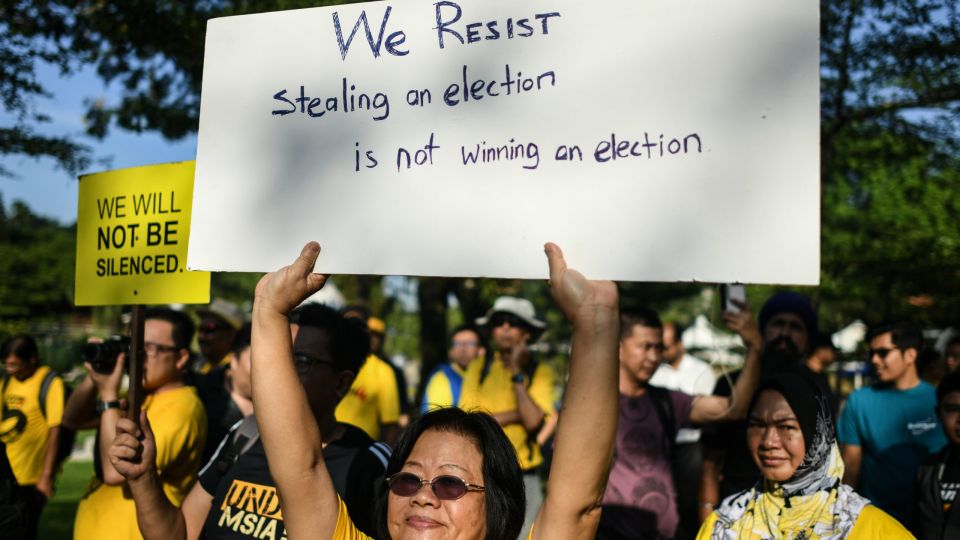March 29, 2018
Malaysía’s recently revealed electoral map has critics accusing the ruling party of drawing voting lines to increase its chances in the next election.
The Malaysian Election Commission’s redelineation report was passed in parliament on Wednesday amid much controversy and chaos which resulted in the suspension of opposition politician Lim Kit Siang.
The report proposes changes to 98 out of 165 parliamentary seats in Peninsular Malaysia, The Star reported – changes that critics say will favour the ruling Barisan Nasional (BN) coalition in the country’s 14th general election.
Of the states mentioned in the report, only seats in the small, northern state of Perlis, which BN won by a more than two third majority in 2013, and Putrajaya, remain unchanged.
According to The Star, these changes range from the minor, such as a name change involving one vowel, to major ones where the boundaries of the seat have been redrawn to double its original size.
Selangor will be facing the most significant changes, according to analysts from electoral reform pressure groups.
Selangor, the country’s richest state, has been under the opposition’s control since 2004 but the ruling Barisan Nasional coalition seems keen to reclaim the jewel for itself.
The opposition alliance – formerly known as Pakatan Rakyat – has enjoyed strong support in the Selangor in the past, at one point even securing a two-thirds majority. But the parting of Malaysian Islamist party PAS from the coalition has significantly loosened its hold on the state.
Selangor has five name changes involving parliamentary seats and nine state seats which will have their names changed, according to The Star.
The boundaries of some of its seats will also be altered, with some seeing an increase in numbers of voters and others seeing a reduction.
Most significantly, the Petaling Jaya Utara seat, which will be renamed Damansara, will see its number of voters increase to approximately 150,439, the largest number of voters for any parliamentary seat, The Star reported.
The other Parliament seats from around the country which will see a significant amount of growth are Petaling Jaya Selatan, renamed Petaling Jaya, which will increase by 62.6%; Beruas (55.05%); Klang (40.33%); and Bukit Bintang (30.99%), The Star reported.
All the seats above are currently held by the Opposition.
Some seats will also shrink considerably.
According to The Star, the seat that will be most affected is the Subang seat (which is set to be renamed to Sungai Buloh), which will shrink by 42.86% or from 128,543 voters to 73,448 voters.
Other seats that will also shrink significantly are Hulu Langat (-34.86%), Lumut (-29.72%), Kapar (-26.38%), and Puchong (-22.72%).
These seats are also currently held by the Opposition.
Overall, of the 98 seats that will see changes, 36 were won in 2013 by Barisan while 62 were won by the Opposition.
According to the South China Morning Post, local electoral experts say the election commission pushes voters likely to vote for the opposition- urban voters and those belonging to certain ethnic minorities – into a few highly populated constituencies, while keeping the number of voters for each seat in rural, Malay-dominated areas – which typically favour BN – low.
Thus, a BN candidate often requires less votes to win the election than an opposition candidate.
Similar forces were thought to be at play in 2013, when the BN coalition managed to narrowly clinch the victory by bagging 133 of the 222 in parliamentary seats despite only winning only 47 per cent of the vote.
According to The Star, activist Wong Chin Huat, who has a doctorate in electoral systems from the University of Essex, said the average size of the parliamentary seats won by Barisan Nasional in the 2013 general election was about 48,000 voters while for the Opposition it was 79,000 voters.
The redelineation motion was strongly opposed by opposition politicians, and protestors gathered outside Parliament.
DAP stalwart Lim Kit Siang was suspended after demanding an explanation on why the motion of redelineation was embargoed after it was kept on the tables of MPs last Thursday and repeatedly refusing to sit down and stop interrupting despite numerous warnings, The Star reported.
Despite the objections, the bill was rammed through parliament with 129 votes for and 80 against.
Speaking at a press conference in Parliament after the redelineation motion was passed, Lim said that it would jeopardise the Opposition’s chances in the general election The Star reported.
“Definitely yes, but if there is a political tsunami nationwide, then I think we will overcome that,” he said, according to The Star.


